Yakuza Gaiden | Spin-Offs To Watch Out For (And Play):
Aside from the several mainline games, the Like a Dragon/Yakuza series also touts a sizable collection of exciting spin-offs!
RGG Studio takes advantage of the creative freedom offered by spin-offs by inventing wild (even for Yakuza) scenarios. Much of the mainline cast is reused in intriguing ways, and popular characters who have long since passed away can return from the dead (in one case, with a machine-gun appendage that makes Barret’s look like a water pistol).
Browse the complete So you want to get into The Like a Dragon Series feature:
Yakuza: Dead Souls
Platforms: PS3
Original Release: June 9th, 2011 (JP), March 13th, 2012 (NA)
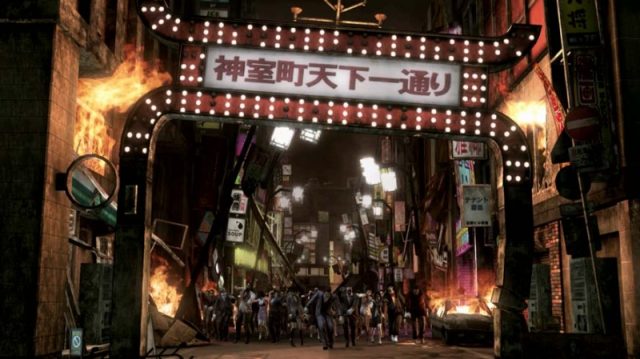
The Tojo Clan (and world) are in crisis! Flesh-eating zombies freely roam the streets of Kamurocho as the government struggles to wall off the district in hopes of containing the apocalypse! Meanwhile, Dragon of Dojima Kazuma Kiryu is on the hunt for his adopted daughter, Haruka, who has (once again) been kidnapped and taken to the zombie-infested Red Light District. With the help of loan-shark-with-a-heart-of-gold Akiyama, in-the-middle-of-a-zombie-apocalypse-and-can’t-believe-his-good-luck Majima, and thought-dead-former-Omi-now-equipped-with-a-machine-gun-arm Ryuji Goda, Kiryu must shoot his way through the undead citizens of Kamurocho to rescue Haruka, uncover the source of the zombie plague, and ensure the survival of the human race forever!
Yakuza: Dead Souls is Dead Rising meets Left 4 Dead meets Kamurocho, and it’s an underrated classic which was buried underneath the slew of zombie games around the time of its release. Yes, the origins of its creation probably center around capitalizing on the zombie craze of the aughts. And yes, the framerate on this PS3 title is…variable, to say the least. But if you can brave the harsh FPS drops towards the end game, you’ve got an enjoyable third-person shooter action game.
Here, Yakuza’s over-the-topness is pushed into overdrive. The opening cutscene begins with an already-kidnapped Haruka, a zombified Kamurocho, and a Kiryu who’s so angry that, with barely any effort, he fractures a cell phone in his hand. Because just cracking the phone is more intense than completely shattering it!
Oh, and it gets better: Dead Souls features both Goro Majima and Yakuza 2 antagonist Ryuji Goda as playable characters. The two sport extreme versions of their already extreme personalities perfectly positioned on top of exaggerated action-movie framing.
Unfortunately, the initial reception of Dead Souls was less than positive, citing the poor shooting controls. In retrospect, however, the gameplay provides a good amount of flexibility. Three different ways to aim and a decent camera are more than enough to adapt to the various zombies you’ll encounter.
If playing a parody of Yakuza made specifically for Yakuza fans by the actual creators of Yakuza sounds like a good time, definitely give Dead Souls a decent shake before you return it to the grave.
Streets of Kamurocho
Platforms: PC
Original Release: October 17th, 2020
Our Reviews: PC
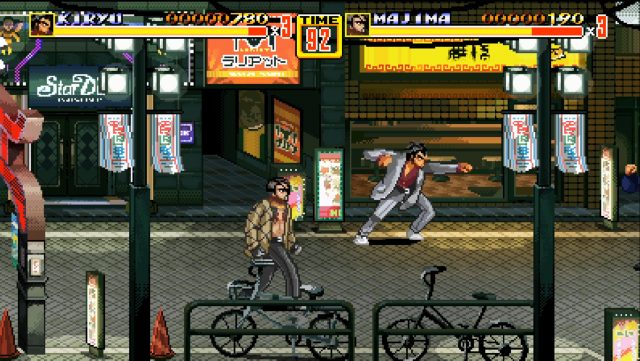
The 16-bit Tojo Clan is in crisis! Akira Nishikiyama has assassinated the Third Chairman, and the only two who can set things right are the Dragon of Dojima, Kazuma Kiryu, and the Mad Dog of Shimano, Goro Majima!
The 60th anniversary of SEGA delivered some unexpected presents to fans in the form of several free games that celebrated their history. One highlight was a romhack of the legendary 16-bit brawler, Streets of Rage 2, transforming it into the Yakuza-themed Streets of Kamurocho!
By reskinning the entire first level of SoR 2 into the world of Yakuza, SEGA created a pitch-perfect homage for fans of both series. The game looks fantastic, with pixel graphics that begs for the chance to further explore this retro-tinted version of Kamurocho. Though both Kiryu and Majima are limited to the moveset of long-time SoR protagonist Axel Stone, it still feels terrific to beat up a seemingly never-ending stream of thugs coming at you from the right side of the screen. There is even an unlockable character, Ichiban Kasuga, available after you beat this admittedly very short game.
Sadly, Streets of Kamurocho is no longer available on Steam, but I hope SEGA won’t forget this ridiculously fun mashup idea. I can imagine that there are at least a few fans out there who would welcome a full-length, 16-bit, side-scrolling Yakuza game!
Fist of the North Star: Lost Paradise
Platforms: PS4
Original Release: March 8th, 2018 (JP), October 2nd, 2018 (WW)
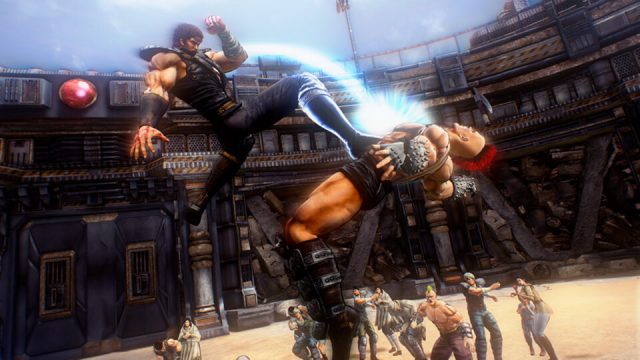
The city of Eden is in crisis! After a devastating nuclear war, the remnants of humanity are at each other’s throats, desperately scrounging for the scraps of resources left behind. In this wasteland, a lone traveler named Kenshiro roams in search of his lost love, Yuria. After uncovering information that she is alive in the city of Eden, humanity’s last bastion of civilization and comfort, he begins a quest to enter the city, be reunited with his love, and maybe change the future of the wasteland forever.
A brutal action-adventure RPG where you fight hordes of enemies, dishing out powerful special moves, exploring a city full of play-spots and minigames, aaaaaaand this is a not-so-subtly redressed Ryu Ga Gotoku game.
Named Hokuto ga Gotoku in Japan (which is a better name, mind you), Lost Paradise is a spin-off only by a very flimsy technicality. Takaya Kuroda, Kiryu’s voice actor, comes along for the ride as Fist of the North Star’s Kenshiro. Players utilize the legendary Hokuto Shinken martial arts style in a reimagined telling of the eponymously named manga, meaning there is a bloody edge to the combat compared to the Yakuza series. For example, Kiryu has never caused his opponents’ heads to explode spontaneously (as he has NEVER killed a soul).
Like the other spin-offs, Lost Paradise takes the series formula to a new setting. Brand-new spectacles and “jumping the shark” moments await you in the city of Eden. Plus, you get to see Kenshiro take bartending way too seriously in a suit. Compared to the mainline entries, the fighting system may not be as satisfying or possess as interesting a departure for a spin-off title. However, fans of this game style will still enjoy the massive amount of side content, even if the game’s tone is generally humorless.
Ryu ga Gotoku Ishin!
Platforms: PS3, PS4
Original Release: February 22nd, 2014 (JP)
Like a Dragon: Ishin!
Platforms: PS4, PS5, PC, XB1, XBSX
Original Release: February 21st, 2023 (WW)
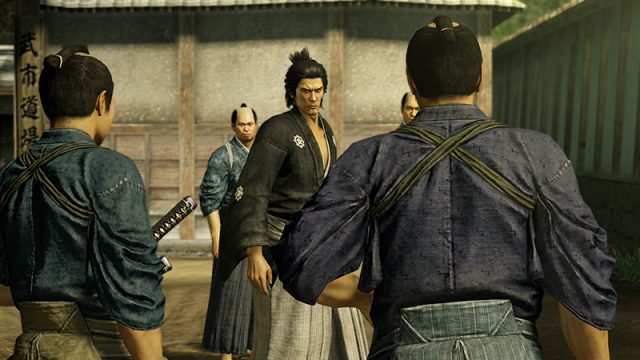
The shogunate is in crisis! Following the end of Japan’s isolationist policies in the late 19th century, Sakamoto Ryoma and his mentor Toshiba Toyo fight to reform Japan’s rigid class system and restore the Emperor to power. But after Ryoma is framed for Toyo’s murder, he is forced to go into hiding, adopting the new identity of Saitō Hajime to undercover the real killer. Finding himself surrounded by potential enemies in the city of Kyo, Ryoma must uncover the truth to clear his name, bring equality to the people, and change the future of Japan forever!
Ryu go Gotoku Ishin! (and the Japanese-only Ryu ga Gotoku Kenzan!, which we will talk about below) is a piece of historical fiction. The game takes place in the Bakumatsu period of feudal Japan and essentially casts the characters of Yakuza into the roles of historical counterparts. In other words, the main character of Sakamoto Ryoma looks and acts exactly like Kiryu, even though he isn’t Kiryu. Character models and voice actors from many Yakuza games appear in new roles, giving the game an element of familiarity while still being able to tell a fresh tale in a brand-new setting.
In terms of gameplay mechanics and graphics, Ishin could be seen as a prototype of Yakuza 0. Ryoma/Kiryu has multiple combat styles you can switch between on the fly (although, in this case, they include a firearm and a sword). In addition, an incredible number of period-appropriate minigames and side activities will keep you playing for just as long as a modern-day Yakuza game.
One reason Yakuza fans were so excited when SEGA announced the remake and its localization — titled Like a Dragon: Ishin! worldwide — was because it gave us hope that some of the other outstanding Ryu ga Gotoku games that were never released in the West could eventually make their way to our shores. So let’s take a look at some of them…
Japanese-Only Spin-offs!
Can you speak Japanese? If so, guess what? You have several other Yakuza games open to you!
While we here in the West can only hope that these titles are eventually localized, you can play them NOW (provided you have access to the proper region software and hardware, of course).
Ryu ga Gotoku Kenzan!
Platforms: PS3
Original Release: March 6th, 2008 (JP)
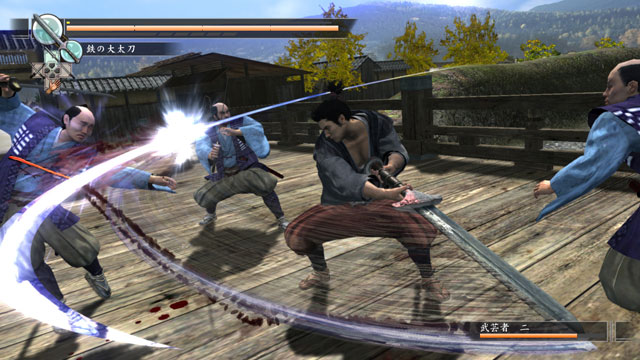
Sengoku-period Japan is in crisis! Five years after the history-defining Battle of Sekigahara, famed swordsman Miyamoto Musashi lives under an assumed name in 1600s-era Kyoto. His life is upended when a young girl named Haruka approaches him with a request to assassinate a man who has apparently stolen his former identity. Little does he know that this bloody request will lead him to uncover a mystery that will bring past crimes to light, forge new alliances, and change the future of Japan forever!
Ryu ga Gotoku Kenzan! was the very first spin-off in the Yakuza series, and set the stage for many of the things that define the series today. While Yakuza 3 was the first of the mainline series to use 3D face-scanning technology and a third-person POV, those innovations were first developed for Kenzan.
Though Kenzan features samurai versions of our beloved cast like Ishin, the game is set hundreds of years earlier, in the Sengoku Period of Japan (1605). The subject matter in many places can be shocking, with topics that are not generally dealt with in video games (CONTENT WARNING: child prostitution). This, along with the historical setting, might be one of the reasons why Kenzan was not localized back in 2008.
While Kenzan is not currently available in the West, it is available to be imported from Japan. However, given Ishin’s 2023 release, it’s likely a matter of time before RGG Studio also brings a remake of this lost classic to Western shores.
Kurohyō: Ryu ga Gotoku Shinshō
Platforms: PSP
Original Release: September 22nd, 2010 (JP)
Kurohyou 2: Ryu ga Gotoku Ashura-hen
Platforms: PSP
Original Release: March 22nd, 2012 (JP)
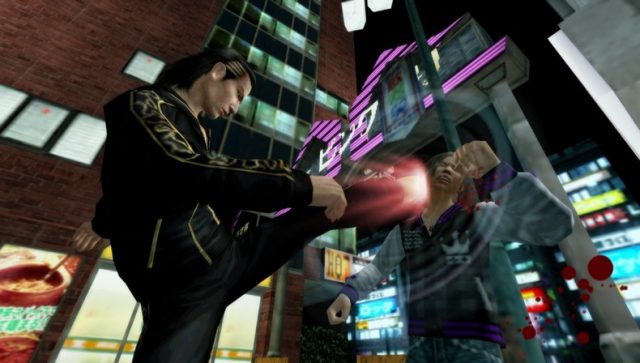
The underground fighting circuit Dragon Heat is in crisis! After accidentally killing a Tojo Clan member, street hood Tatsuya Ukyo is forced by a manipulative patriarch into a deadly underground fighting tournament in Kamurocho. As Tatsuya continues in his quest to become the champion, he begins to uncover clues that his “victim” may, in fact, still be alive. Tatsuya must uncover the truth of the “murder,” navigate the treacherous world of the yakuza, and maybe even change the future of the Dragon Heat coliseum forever!
Do you miss the fixed camera angles and blockier character models of the PS2-era Yakuza and Yakuza 2? Well then, the Kurohyō: Ryu ga Gotoku Shinshō spin-offs are for you!
Roughly translating to Black Panther: Like a Dragon, Kurohyō shrinks everything you’d expect from Yakuza into a much smaller form factor. Paring the series down onto the PSP couldn’t have been easy, but RGG Studio and partner developer syn Sophia managed it! Delivering an entirely new story with brand-new characters, the Kurohyō series tells the tale of street punk Tatsuya Ukyo and his quest to become the new king of the underground coliseum. Admittedly, it’s not quite as complex a plot as the average Yakuza game, but it is plenty ambitious for a PSP title circa 2010!
And don’t let the smaller scale of these titles fool you into thinking that these handheld titles aren’t full-fledged Yakuza games. They might be spin-offs, but they have a surprising amount of side content and minigames, just like any other entry in the series. Karaoke, hostess clubs, and the casino are all here, along with a complete (if pre-rendered) version of Kamurocho. Rather than using in-game character models or pre-rendered cutscenes to tell their stories, these titles use hand-drawn, comic-book style graphics. It all combines into a remarkably in-depth experience, especially if you’re looking for a throwback to the earlier titles in the series.
While these two titles are currently only available in Japan, there are fan translations on the internet. Thus, proving once again that if the developers aren’t going to localize titles for the West, the fans will do it for them!
Ryu ga Gotoku Online
Platforms: iOS, Android, PC
Original Release: November 21st, 2018 (JP)
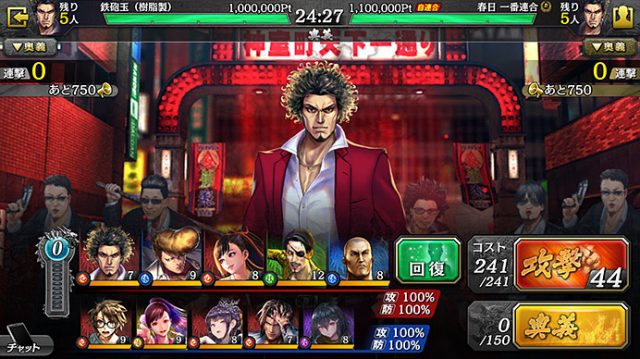
The Tojo Clan has fallen! Seventeen years after being sent to jail for a murder he didn’t commit, ex-yakuza Ichiban Kasuga returns to Kamurocho to find… Wait, there is something very familiar about all this…
With the incredibly detailed locations offered in the Yakuza series, many have speculated that the series would be a perfect fit for an online MMORPG. Well, if you can speak Japanese, you may be in luck with Ryu ga Gotoku Online!
Unfortunately, RGG Online is likely not the type of online game you hoped for. Rather than a brawler, combat is card-based. Exploration isn’t free-roam, but menu-based. 2D art of varying styles and quality replaces the 3D character models. And worst of all, gacha is the rule of the day. If you want to “play” as classic characters like Kiryu and Majima, you need to pay for loot boxes in hopes of landing a rare card. In other words, RGG Online is basically a card-collecting slot machine (which… actually sounds a lot like a Yakuza minigame).
All of that said, RGG Online offers many unexpected side stories that fill in dozens of plot gaps in other entries of the series. For example, ever wonder what happened to Kuze after Yakuza 0? Or how Haruka and Hamazaki got along after Kiryu left for Kamurocho in Yakuza 4? You might find the answers you seek here! In fact, the entire plot of Yakuza: Like a Dragon is a reimagined version of the original story of Ryu ga Gotoku Online, Ichiban and all.
But honestly, our main complaint about RGG Online is that they went with card-based combat instead of a Yakuza-themed version of mahjong. I mean, come on, it was right there!



